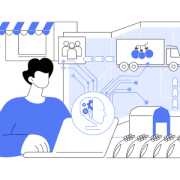AI can be applied to various elements of the supply chain, including forecasting, process and procedure optimization, supplier selection and evaluation, and automation and decision support for configuration, design, and planning.
AI-powered systems provide organizations with the ability to process large, complex data sets in real time to enhance forecasting accuracy. Other benefits of AI-powered supply chain systems include real-time production tracking, prevention of order shipment delays, process optimization, and customer product prediction.
Supply chain resilience also builds on elements of the smart factory, including the supplier quality management system, real-time data exchange, and predictive analytics to enable data-driven insights and actions. Supply chain resilience requires proactive, prescriptive, guided risk mitigation, which involves organizational agility, rapid turnaround time to respond to planned and unplanned events, and flexible and dynamic connections between stakeholders in the supply chain ecosystem.
Our data analysis found that AI technologies can enhance each dimension of resilience to enable resilience in agri-food supply chains. In summary:
-
Readiness. AI enables real-time data sharing, enhancing forecasting capabilities and enabling effective supply chain planning and dynamic inventory management.
-
Responsiveness. AI-powered supply chain management tools support rapid reconfiguration of suppliers.
-
Recovery. AI facilitates the effective management of human resources and improves process efficiency and productivity.
-
Adaptability. AI improves the agility and sustainability of supply chains by providing actionable insights.
AI is increasingly being used by organizations for the procurement of short-term workers, which in turn increases resilience as supply chain managers seek innovative ways to mitigate the looming labor shortage.
AI can also be leveraged to improve employee safety by using machine vision to monitor the use of personal protective equipment and verify that employees are adhering to the company’s health and safety protocols and industry-wide standards. Companies can also use AI to process data from systems aboard company vehicles to monitor whether drivers are operating them safely. AI can enhance adaptability by providing logistical solutions to minimize shipment lead times by coordinating important shipping documents, determining any missing documentation, and recommending actions to avoid risks proactively.
[For more from the authors on this topic, see: “How AI Enables Resilience in Agri-Food Supply Chains.”]







